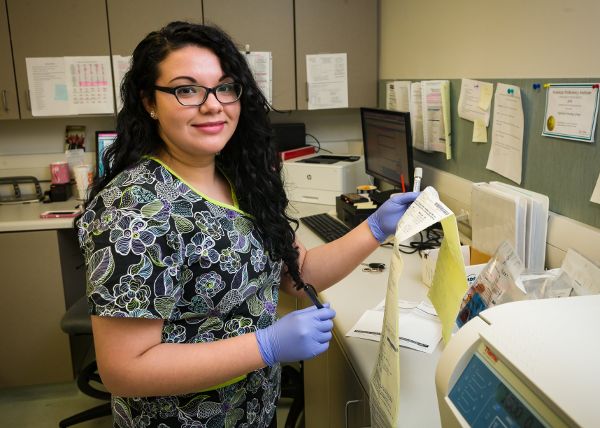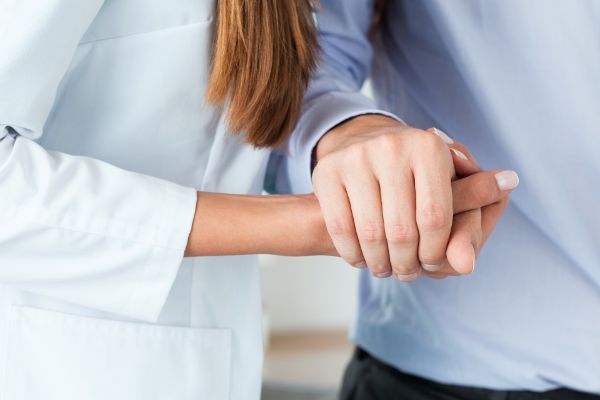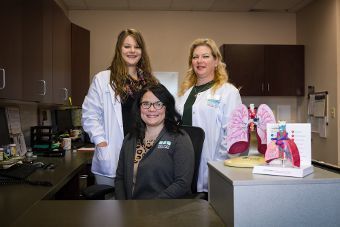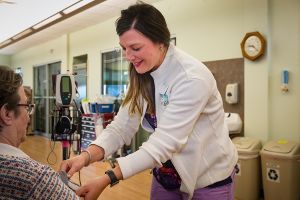This is a list of the most common side effects resulting from chemotherapy. This list does not include all side effects from all drugs, but does include those side effects we see most often.
Allergic Reaction – If this side effect were to occur, you might develop hives or a rash, swelling, fever, chills, difficulty breathing, or even low blood pressure. If any of these occur as a result of your medication, you may be given additional anti-allergy medication. Your chemotherapy will be stopped during the reaction and perhaps re-started after the reaction subsides, or stopped and re-scheduled for another day, or discontinued.
Appetite Changes – Foods and liquids may taste different to you because the cells in your mouth, stomach, and intestines have been affected by your chemotherapy. In addition, if you are inactive, this may also decrease your appetite. Despite a poor appetite, it is important to eat nutritiously to help your body recover from the effects of chemotherapy.
Loss of appetite is one of the most common problems that occur with cancer and its treatment. No one knows exactly what causes loss of appetite. It may be caused by the treatments or by the cancer itself. Emotions such as fear or depression can also take away a person’s appetite. For some people, loss of appetite happens for just a day or two; for others, it’s an ongoing concern.
Anemia or Low Red Blood Cell Count – Anemia means the number of red blood cells (RBCs) circulating in your blood is lower than normal. Red blood cells are important because they deliver oxygen to your body. These blood cells are produced in the bone marrow. When chemotherapy kills cancer cells it also kills normal cells such as the red blood cells. Anemia caused by chemotherapy is temporary and usually does not occur for two or more months.
You may experience the following symptoms if your RBCs are low:
- Fatigue, weakness or have a lack of energy
- Dizziness or lightheadedness
- Shortness or breath
- Chest pain
- Difficulty concentrating
- Your skin color may become pale
- Difficulty staying warm
Low Platelet Count – Platelets are the cells in your blood that form blood clots to stop bleeding. They are produced in your bone marrow. As mentioned before, chemotherapy not only kills cancer cells but also healthy cells, such as your platelets. If your platelet count is going to be affected by your chemotherapy, then it will fall 8 to 14 days after your chemotherapy.
If your platelet count is low, you may notice the following:
- Bruise easily or unexplained bruises
- It takes longer to stop bleeding after an injury
- Your gums bleed while brushing your teeth
- Develop nose bleeds more easily
- A headache that will not go away
If you notice any of the above signs or symptoms, notify your doctor.
Low White Blood Cell Count or Neutropenia – White blood cells (WBCs) are the cells that travel throughout your body and help to fight off infection. White blood cells are produced in the bone marrow. When your chemotherapy kills your cancer cells it also kills some of your normal cells such as your white blood cells. WBCs live for a very short amount of time, sometimes just hours after leaving the bone marrow. If your white blood cell count is going to drop after chemotherapy, it will occur 8 to 12 days afterwards.
Your doctor or nurse will check your blood counts throughout your chemotherapy treatments. They will be watching your white blood cell count carefully. When your white blood cell count reaches its lowest point, called nadir, your doctor may choose to treat your low WBC count with medications such as Neupogen or Neulasta. These medications stimulate your bone marrow to produce more white blood cells more quickly, thus avoiding treatment delays.
If you notice any of the following while receiving chemotherapy, please notify your doctor:
- Fever – temperature greater than 100.4
- Chills
- Sore throat
- Cough
- Runny nose
- Ear ache
- Burning with urination
- Pain, redness, or swelling at the site of an injury, or at a central line, port, or needle site
Breathing Problems – A few chemotherapy medications may cause breathing problems. This is usually temporary. However, you will need to notify your doctor or nurse if you notice that you are having difficulty breathing.
Constipation – Some drugs, such as chemotherapy and pain medications, can cause constipation. This problem can also occur if your diet lacks enough fluid or fiber, or if you have been inactive.
Dental and Gum Problems – Cancer and cancer treatment can cause tooth decay and other problems with your teeth and gums. For example, radiation to your mouth can affect your salivary glands, making your mouth dry and increasing your risk of cavities. If you eat often or eat a lot of sweets, you may need to brush your teeth more frequently. Brushing after every meal is a good idea.
Depression – Depression related to your chemotherapy or your condition is more than feeling “blue” or “down”. It is a depressed mood and a loss of interest or pleasure in many activities. Depression may be associated with: a lack of participation in daily activities, difficulty sleeping or sleeping too much, feelings of hopelessness or worthlessness, difficulty thinking, and recurrent thoughts of death. Depression is a medical condition that is treatable.
Diarrhea – Chemotherapy can cause diarrhea by altering the cells that line the digestive tract. Diarrhea means loose bowel movements that are sometimes frequent. Abdominal cramping may accompany the diarrhea. Diarrhea caused by chemotherapy is usually temporary.
Dry Mouth – Chemotherapy and radiation therapy to the head and neck area can reduce the flow of saliva and cause dry mouth. When this happens, foods are harder to chew and swallow. Dry mouth can also change the taste of food.
Fatigue – When receiving chemotherapy, you may have a change in your normal activities, a change in your diet, or may not sleep as well. A change in any of these areas can create the feeling of fatigue or tiredness. This tired feeling or lack of energy may not improve with rest. Fatigue is temporary and your previous energy level should return a few weeks after you complete chemotherapy.
Fever – An elevated temperature can occur after you receive your chemotherapy. It is your body’s response to the medications. Otherwise, you should not have a fever. If you develop fever that is greater than 100.4, you should call your doctor or nurse.
When you have fever, you should:
- Check your temperature every 4 hours
- Drink extra non-caffeinated beverages
- Take Tylenol (acetaminophen) every 4 hours. DO NOT take aspirin or ibuprofen as it can cause bleeding.
Hair Loss – When chemotherapy attacks both cancer cells and normal cells this includes your hair follicles. Depending upon the type of chemotherapy and the dose, some or all of your hair may fall out. This may include your eyebrows, eyelashes, facial, and pubic hair.
Your hair will begin to grow again a few weeks after you complete chemotherapy. You new hair grow may grow back a different color or texture. This change may last as long as two years.
Hearing Changes – Some chemotherapy medications may cause ringing or other noises in your ears or may decrease your ability to hear high tones. If you experience this side effect, you need to report this to your doctor.
Injection Site Reaction – Chemotherapy can sometimes cause symptoms at your IV site or along the vein. If you notice burning, stinging, swelling, redness, or pain at the time your chemotherapy is infusing, notify your nurse right away. If you notice redness, swelling, warmth, or pain at your IV site or along a vein once you return home, you need to call your doctor or nurse.
Mouth Sores/Sore Throat – Mouth sores, tender gums, and a sore throat or esophagus can result from radiation therapy, chemotherapy, or infection. If you have a sore mouth or gums, call your doctor or nurse. There are medications available that will help with mouth or throat discomfort.
Mouth sores will occur 5 to 14 days after chemotherapy. These sore patches will sometimes heal between cycles of chemotherapy or they may not heal completely until chemotherapy is stopped.
Nausea/Vomiting – Nausea, with or without vomiting, can occur with surgery, chemotherapy, and radiation therapy. There are other conditions unrelated to your cancer or treatment that can also cause nausea. Most nausea and vomiting occur within 24 hours of receiving chemotherapy; however, nausea and vomiting may occur days later. Some people may never experience nausea, but for those who do, there are measures available that effectively control this side effect.
If you are currently receiving chemotherapy treatments, take your anti-nausea medication as instructed in order to prevent nausea and vomiting. You may be instructed to take this medication for a day or two following your treatment. It is easier to prevent nausea and vomiting than it is to stop it once it has started. If you have nausea or vomiting that is not controlled by your medications, call and let us know.
Vomiting may follow nausea and may be caused by the treatment, food odors, gas in the stomach or bowel, or motion. In some people, certain associations or surroundings, such as the hospital, may cause vomiting.
Taste and Smell Changes – Your sense of taste or smell may change during your illness or treatment. Foods, especially meat or other high-protein foods, can begin to have a bitter or metallic taste, or may taste bland. For most, changes in taste and smell go away when their treatment is finished.
Weight Loss – Many cancer patients lose weight during their cancer treatment because of: the cancer itself, loss of appetite, the treatment, or emotional worries.
Some patients find their weight does not change during treatment. They may even gain weight. This is particularly true for breast, prostate and ovarian cancer patients taking certain medications such as steroids, or hormone therapy, or chemotherapy.







